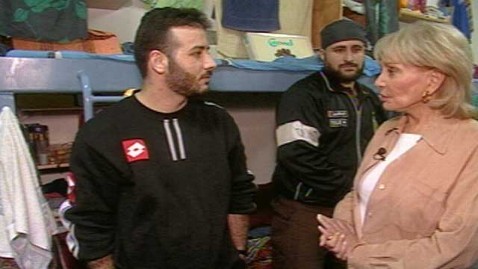At Ease With Barbara Walters - and Hamas Fighters - in Israeli Prison
Reporter's Notebook By Michael Mendelsohn
If you've ever been to an American maximum-security prison, you know very well that visitors - for their own safety - are almost never allowed in the inmates' general living quarters. I expected the same rule to apply when I visited a maximum-security prison in Be'er Sheva, Israel, in 2005. Traveling with Barbara Walters and senior producer Rob Wallace, we were at the prison to interview Palestinian suicide bombers who, obviously, had failed in their mission.
Imagine our surprise when a guard led us past, and then into, a 1,000 square-foot fenced-in courtyard teeming with roughly 50 Palestinian prisoners, who were getting their daily exercise by walking round-and-round in fast, tight circles. Rob and I, and our camera crews, might have seen ourselves as expendable - but we were with the irreplaceable Barbara Walters. Were we on the Israeli version of "What Would You Do?" We were all too stunned to be frightened.
Curious and friendly prisoners swarmed us, with our translator volleying furiously between Arabic and English so that everyone could be understood. We learned quickly that we were in the Fatah section of the prison. Prisoners who were members of Fatah - the Palestinian political party founded by Yasser Arafat - did not get along with other prisoners who were members of the more militant Palestinian organizations Hamas and Islamic Jihad. Even Hamas and Islamic Jihad had to be separated from one another - a shared hatred of Israel apparently not being enough to unify them even within the depressing, gray prison walls.
As we were led away from the courtyard, it dawned on us that the Israeli guards escorting us had no visible weapons on them. In fact, they seemed downright relaxed and cheerful as they brought us through a wing of the prison occupied by Hamas. The wing had about 10 cells, five on each side. Each cell held up to eight Hamas prisoners, some lounging on their beds reading, some watching TV, some even cooking. Prisoners approached their cell doors to greet us, and then - though we shouldn't have been shocked at this point - they pushed open the doors to greet us. This one liberty, a guard explained, was granted to the senior leaders of Hamas being held at the prison.

ABC News
I thought that these men, as senior leaders, must be nonviolent prisoners. As with much of what I assumed about life within this Israeli prison, I was wrong again. Barbara entered a cell and began a conversation with a prisoner who said he had killed three Israelis in retaliation for an attack on a mosque in which 21 Palestinians died.
Barbara asked him how he did it. "With a knife," he responded in Arabic. "I had nothing but a knife … They have a saying: 'They started first.'"
The Israeli guard closest to us jumped in to explain, in English and Arabic, that although some of the prisoners had committed murder, they were nonetheless viewed as political prisoners - prisoners who could one day be released early in a prisoner swap, as a result of a peace plan, or simply as a gesture of good will. The guard then shook the prisoner's hand, each smiling warmly at the other and perhaps dreaming of the prospect.
Watch the full story on "20/20? tonight at 9 p.m. ET